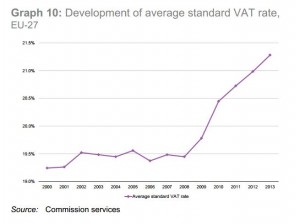I’ve always had a soft spot in my heart for Bill Clinton. In part, that’s because economic freedom increased and the burden of government spending was reduced during his time in office.
 Partisans can argue whether Clinton actually deserves the credit for these good results, but I’m just happy we got better policy. Heck, Clinton was a lot more akin to Reagan that Obama, as this Michael Ramirez cartoon suggests.
Partisans can argue whether Clinton actually deserves the credit for these good results, but I’m just happy we got better policy. Heck, Clinton was a lot more akin to Reagan that Obama, as this Michael Ramirez cartoon suggests.
Moreover, Clinton also has been the source of some very good political humor, some of which you can enjoy here, here, here, here, and here.
Most recently, he even made some constructive comments about corporate taxation and fiscal sovereignty.
Here are the relevant excerpts from a report in the Irish Examiner.
It is up to the US government to reform the country’s corporate tax system because the international trend is moving to the Irish model of low corporate rate with the burden on consumption taxes, said the former US president Bill Clinton. Moreover, …he said. “Ireland has the right to set whatever taxes you want.” …The international average is now 23% but the US tax rate has not changed. “…We need to reform our corporate tax rate, not to the same level as Ireland but it needs to come down.”
Kudos to Clinton for saying America’s corporate tax rate “needs to come down,” though you could say that’s the understatement of the year. The United States has the highest corporate tax rate among the 30-plus nations in the industrialized world. And we rank even worse – 94th out of 100 countries according to a couple of German economists – when you look at details of how corporate income is calculated.
And I applaud anyone who supports the right of low-tax nations to have competitive tax policy. This is a real issue in Europe. I noted back in 2010 that, “The European Commission originally wanted to require a minimum corporate tax rate of 45 percent. And as recently as 1992, there was an effort to require a minimum corporate tax rate of 30 percent.” And the pressure remains today, with Germany wanting to coerce Ireland into hiking its corporate rate and the OECD pushing to undermine Ireland’s corporate tax system.
All that being said – and before anyone accuses me of having a man-crush on Bill and/or of being delusional – let me now issue some very important caveats.
When Clinton says we should increase “the burden on consumption taxes,” that almost surely means he would like to see a value-added tax.
 This would be a terrible idea, even if at first the revenue was used to finance a lower corporate tax rate. Simply stated, it would just be a matter of time before the politicians figured out how to use the VAT as a money machine to finance bigger government.
This would be a terrible idea, even if at first the revenue was used to finance a lower corporate tax rate. Simply stated, it would just be a matter of time before the politicians figured out how to use the VAT as a money machine to finance bigger government.
Indeed, it’s no coincidence that the welfare state in Europe exploded in the late 1960s/early 1970s, which was also the time when the VAT was being implemented. And it’s also worth noting that VAT rates in recent years have jumped significantly in both Europe and Japan.
Moreover, Clinton’s position on fiscal sovereignty has been very weak in the past. It was during his tenure, after all, that the OECD – with active support from the Clinton Treasury Department – launched its “harmful tax competition” attack against so-called tax havens.
